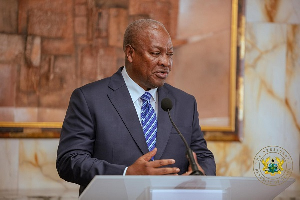S. Kwaku Asare
Constitutional amendments rewrite the terms of the charter governing the separation of the branches of government and the boundary between the citizens’ rights and the government’s exercise of its power. Therefore, all Constitutions provide in very clear language the manner in which it can be amended or revised. Ghana's Constitution is no exception. It devotes chapter 25 (and chapter 25 alone) to describing how it should be amended. Chapter 25 commences with Article 289(1), which provides that, “Subject to the provisions of the Constitution, Parliament may, by an Act of Parliament, amend any provision of this Constitution.” Further, Article 289(2) provides that, “This Constitution shall not be amended by an Act of Parliament or altered whether directly or indirectly unless (a) the sole purpose of the Act is to amend this Constitution; and (b) the Act has been passed in accordance with this Chapter” (Constitution 1992, Article 289(2)). Article 289 (1) is critical. It vests the power to amend the Constitution in Parliament and Parliament alone! It is also important to observe that Parliament’s power to amend the Constitution does not derive from its general legislative authority under Article 93(2) but from the specific grant of authority in Article 289(1). Further, Parliament has no obligation to amend the Constitution. Nor can the President, or other Constitutional bodies, conscript Parliament into amending the Constitution. The power granted under Article 289(1) is the power to choose to amend or not to amend the Constitution. When Parliament, and Parliament alone, decides to amend the Constitution as provided in Article 289, the Constitution further stipulates how Parliament should go about it as described below. Where Parliament intends to amend an entrenched provision, the bill to that effect “shall be published in the Gazette but shall not be introduced into Parliament until the expiry of six months after the publication in the Gazette under this clause (Article 290).” Moreover, “a bill for the amendment of an entrenched provision shall, before Parliament proceeds to consider it, be referred by the Speaker to the Council of State for its advice and the Council of State shall render advice on the bill within thirty days after receiving it. After the bill has been read the first time in Parliament it shall not be proceeded with further unless it has been submitted to a referendum held throughout Ghana and at least forty percent of the persons entitled to vote, voted at the referendum and at least seventy-five percent of the persons who voted cast their votes in favour of the passing of the bill. Where the bill is approved at the referendum, Parliament shall pass it.” Lastly, Article 290(6) provides that, “where a bill for the amendment of an entrenched provision has been passed in accordance with this Article [290], the President shall assent to it. Where Parliament intends to amend a non-entrenched provision, Article 291 provides that “the bill shall not be introduced into Parliament unless it has been published twice in the Gazette with the second publication being made at least three months after the first; and at least ten days have passed after the second publication. Further, the Speaker shall, after the first reading of the bill in Parliament, refer it to the Council of State for consideration and advice and the Council of State shall render advice on the bill within thirty days after receiving it. Where Parliament approves the bill, it may only be presented to the President for assent if it was approved at the second and third readings of it in Parliament by the votes of at least two thirds of all the members of Parliament.” Lastly, Article 291(4) provides that where a bill for the amendment of a non-entrenched provision has been passed in accordance with Article 291, the President shall assent to it. In effect, Article 289(1) expressly designates Parliament, and Parliament alone, as the body that “may, by an Act of Parliament, amend any provision of this Constitution.” If, and when, Parliament chooses to amend the Constitution, the balance of Chapter 25 then stipulates the processes and procedures that must be followed. In the case of an entrenched provision, Parliament’s primary and plenary role is to initiate the amendment process with an amendment bill. The speaker acts as a conduit to channel this parliamentary initiated bill to the Council of State for advice. When the people approve the bill at a referendum, Parliament is required to pass the bill and hence performs a mere ministerial role at that point. In the case of a non-entrenched provision, Parliament not only has a primary and plenary role to initiate the amendment process with an amendment bill, it also has the power to vote on the passage of the bill after the speaker has channeled the parliamentary initiated bill to the Council of State for advice. In both cases, the President is tasked to perform a ministerial role after the bill has passed. Thus, at very clearly defined phases of the amendment process, the Speaker of Parliament, the Council of State and registered voters (in the case of an entrenched provision) are involved in the amendment process to perform specific roles. On careful examination, it can easily de discerned that the power granted to Parliament under Article 289(1) is therefore the power to propose and pass amendments to the provisions of the Constitution in the form of amendment bills. However, in the case of entrenched provisions, the power to pass an amendment bill is merely a ministerial power, although Parliament is in control of the power to propose the bill. The most important observation from the above discussion is that the Constitution does not grant the President any constitutional role in the frontend (initiation to passage) of the amendment process. The President’s sole role in the amendment process is at the backend and even here he only wields the ministerial power of assent.
One might ask whether having been excluded from the frontend amendment process, the President can fall on his power to appoint Commissions under Article 278(1) to insert himself into the amendment process or more dangerously to initiate constitutional amendments. The answer is a resounding no because a general power, such as the power to appoint Commissions, must always yield to a specific power, such as the power to amend the Constitution. But there are more reasons why the President cannot do so.
According to the Constitution, its provisions can be amended only by a Parliamentary initiative (Article 289(2)). Although constitution review commissions are an option for initiating constitutional amendments, this option has not been sanctioned by the Constitution. In the same vein, constitutional amendments of the 1992 Constitution cannot be initiated by popular initiatives or constitutional conventions. A Constitution must state ex ante the type of initiatives that are permissible for its amendments. In Burkina Faso, the President can initiate constitutional reform (under their Constitution Article 161) but not so in Ghana. Although amending the Constitution may be of public interest, it falls outside the scope of Article 278(1) which allows the President to appoint a commission of inquiry into any matter of public interest where the President is satisfied that a commission of inquiry should be appointed. The Commissions of Inquiry contemplated by Article 278(1) have nothing to do with amending the Constitution! Those Commissions are to serve as an independent inquiry to investigate and establish the truth relating to a specific occurrence, affair or the activities of an entity. The interested reader should refer to Chapter 23 of the Constitution for a description of Article 278(1) Commissions’ inquiry procedures, nature, powers, functions, the effect of their findings as well as the immunities and privileges of witnesses appearing before them. All Article 278 Commissions are regulated by the Rules of Court Committee. The Commissions of Inquiry (Practice and Procedure) Rules, 2010 C.I. 65 drawn by the Rules of Court Committee have nothing to do with Constitutional Reform and Amendments. In C.I. 65, a commission is characterized as having the powers of the police for the purposes of entry, search, seizure and removal of a document or an article relevant to the inquiry of the Commission (section 3). The rules discuss the establishment of investigation units (section 7(1)(a)), notice of hearing to a person whose conduct is the subject of the inquiry (section (8)(c)), compellable witnesses, admission of incriminating evidence (section 14), etc. None of the rules in C.I. 65 will apply to the Constitutional Review Commission. In fact, this is why the 10 people handpicked by the President to review the Constitution claim to have developed their “own values, principles, strategies and modus operandi” to review the Constitution ostensibly on behalf of all the other 25 million or so citizens. The CRC has no such power and cannot make up its own rules. All Article 278 Commissions must operate under the rules set up by C.I. 65. If C.I. 65 rules do not fit the CRC then the CRC does not fit under Article 278. The interested reader who wants to know more about Commissions should read the Memorandum on the Proposal for a Constitution of Ghana, 1968 and the Proposals for the Establishment of a Transitional (Interim) National Government for Ghana, 1978.
Those who framed our 1992 Constitution have wisely excluded the President from the frontend amendment process. The President has been assigned a backend mandatory assent function. The reason the framers did that was to avoid the turmoil that we are currently witnessing in Burkina Faso. It is important that we not allow the President to subvert the Constitution’s amendment architecture.
Opinions of Wednesday, 5 November 2014
Columnist: Asare, Kwaku S.





![Fatawu Issahaku [L] and Jordan Ayew Fatawu Issahaku [L] and Jordan Ayew](https://cdn.ghanaweb.com/imagelib/pics/718/71828066.295.jpg)









